|
|
|
Sort Order |
|
|
|
Items / Page
|
|
|
|
|
|
|
| Srl | Item |
| 1 |
ID:
126620


|
|
|
|
|
| Publication |
2013.
|
| Summary/Abstract |
Maritime territorial disputes have become a hot issue in regional security and a pressing issue for Taiwan's national security. While Taiwan is persistently claiming sovereign right over the large part of the South China Sea based on the U-shaped line, its role is however weakened as a result of the cross-strait hostility and its prolonged hands-off policy. Of course, its ambiguous international status, difficult relation with mainland China and domestic political confusion on nation's future have more to do with its inactive role in the South China Sea disputes. This insecurity contributes to its ambivalent policy. This articleintends to address Taiwan's legitimate claim for the part of the South China Sea, which has been unknown and neglected by the international community, and examine the reasons why Taiwan had taken inactive policy toward the South China Sea. Alerted by recent aggressive moves of other claimants, Taiwan is now shifting to a reasonable tougher strategy in the South China Sea. The articlealso projects the course of fresh efforts made by the Taiwan government pressurised by the public with increasing awareness of urgency.
|
|
|
|
|
|
|
|
|
|
|
|
|
|
|
|
| 2 |
ID:
128436
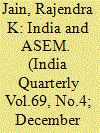

|
|
|
|
|
| Publication |
2013.
|
| Summary/Abstract |
Indian membership of the Asia-Europe Meeting (ASEM) represents an interesting case study of identity and exclusion of a major Asian country from a key interregional forum. Examining the vicissitudes of India's decade-long quest for membership of ASEM since its inception, this article highlights how the exclusionary definition of Asia in Western and Asian discourses kept India out of regional entities. It discusses the arguments of Asian and Western critics of Indian membership in ASEM and concludes that India's purposeful and constructive Look East Policy since the early 1990s and membership of the East Asian Summit facilitated Indian membership of ASEM.
|
|
|
|
|
|
|
|
|
|
|
|
|
|
|
|
| 3 |
ID:
127051
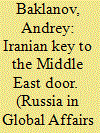

|
|
|
|
|
| Publication |
2013.
|
| Summary/Abstract |
The election of Hassan Rouhani as Iran's president attracted everyone's attention with the inaugural ceremony attended by officials from more than 50 countries. The event gave rise to numerous propositions about a possible progress in the regime and in Tehran's future relations with the rest of the world. The prevailing perception is that the victory of a moderate and pragmatic candidate gives hope for a more fruitful dialogue which may facilitate the solution of numerous persisting problems. There is a good deal of reasoning in the propositions, yet deep-seated stereotype thinking still prevails. The assessments definitely need serious correction if we do not want to miss the opening opportunities - once again. In a situation of rigid Western economic sanctions and complicated relations with practically all of its neighbors, Iran nevertheless is turning into a most important state in a vast geopolitical area that embraces the Middle and Near East, Central and Western Asia. The Iranian aspect is present in practically all international problems that draw global attention, such as nuclear nonproliferation, the Middle East peace process, the legal status of the Caspian Sea, Central Asia, etc. Tehran is an active participant in the dialogue of civilizations and, naturally, remains one of the key players on the hydrocarbon market. To a large extent, Iran's role has been enhanced by the difficulties brought about by the Arab Spring in other major countries in the region, including Egypt - Iran's traditional competitor - which is sinking into the quagmire of internal political confrontation. Prior to the presidential election I happened to visit Iran and talk with some leading politicians and clerics about the situation in the country, their perception of the Iranian nuclear program and other issues that link Iran with other countries in the region and major world powers. Given the role played by the religious factor, it was particularly interesting to hear the opinions of religious leaders when visiting the holy Shi'ite city of Qom.
|
|
|
|
|
|
|
|
|
|
|
|
|
|
|
|
| 4 |
ID:
127025
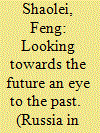

|
|
|
|
|
| Publication |
2013.
|
| Summary/Abstract |
With the world's political and economic focus gradually shifting to the Asia-Pacific region, bilateral relations between China and Russia are facing new challenges and opportunities. For both China and Russia, the current changes may have a more profound impact on and significance for readjusting their development strategies than any changes that took place in previous decades.
|
|
|
|
|
|
|
|
|
|
|
|
|
|
|
|
| 5 |
ID:
127026
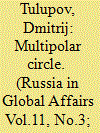

|
|
|
|
|
| Publication |
2013.
|
| Summary/Abstract |
International cooperation in the Arctic has been expanding steadily since the start of the 21st century, assuming systemic outlines over a relatively short period of time (from 2006 till 2013), as evidenced by a series of development concepts approved by the interested countries for their respective regions. The review of these documents indicates that most of the key tasks lie in the foreign policy field, with Arctic diplomacy playing a major role in their implementation. Unique geographical and climatic features make the Arctic truly international. The Arctic Ocean is a center of gravity for polar and off-polar nations. Dividing lines here are less noticeable than on land, but this does not detract from their legal significance. More often than not, resources within the exclusive economic zones of the five littoral states are transboundary in nature and their development (e.g., Shtokman field, Yamal LNG) requires the creation of international consortiums. Apart from cooperation, the Arctic states also have to coordinate their mutual interests and regulate disputes. All these aspects in their entirety form the thematic area within which Arctic diplomacy is used
|
|
|
|
|
|
|
|
|
|
|
|
|
|
|
|
| 6 |
ID:
127068
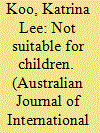

|
|
|
|
|
| Publication |
2013.
|
| Summary/Abstract |
The 2001 conflict in Afghanistan has attracted a great deal of international controversy. The impact of the conflict on Afghanistan's children has been no exception. The research conducted by the United Nations and child protection organisations on the experiences of Afghan children throughout the conflict paints a bleak picture. Accounts of children being directly targeted, accidently killed, abducted, actively fighting in armed groups, denied humanitarian assistance or simply struggling to be healthy, happy, educated and secure amid this conflict are a reminder that conflict devastates children's lives. However, while this research demonstrates that children are often war's innocent victims, the ways in which this research is narrated, particularly by belligerent parties to the conflict, are far from innocent. This article examines the political manipulation of research on Afghan children affected by armed conflict. It argues that Afghan children and their experiences have become a powerful moral symbol that is used by belligerents to advance political, military and strategic agendas.
|
|
|
|
|
|
|
|
|
|
|
|
|
|
|
|
| 7 |
ID:
127027
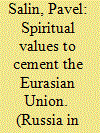

|
|
|
|
|
| Publication |
2013.
|
| Summary/Abstract |
Since Vladimir Putin officially introduced the idea of a Eurasian Union (EAU) two years ago, it has become obvious that the Russian authorities are determined to create a new integration association in the former Soviet Union and that this association will be not only economic or military, but also political. Interestingly, however, all lobbyists for the EAU emphasize only economic interests and practical benefits. The tone was set by the Russian president who stressed that this would be only an economic organization. The name of the future association has been amended as well - now it is referred to not just as a Eurasian but a Eurasian Economic Union.
However, international, including European, practices show that purely material interests are not enough to bring about full-scale and, most importantly, long-term and successful integration. It is only a common ideology and a common system of views that will allow people of all countries in a Eurasian Union to feel as one. One simply needs to invent
|
|
|
|
|
|
|
|
|
|
|
|
|
|
|
|
|
|
|
|
|